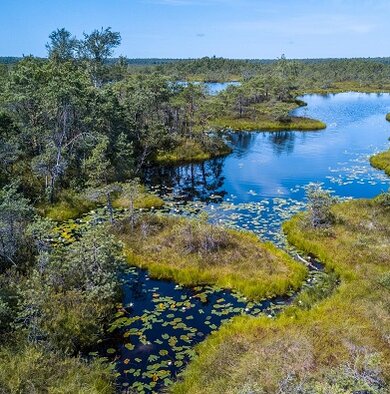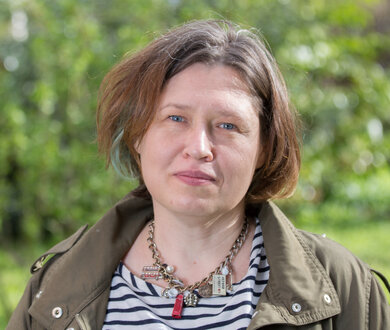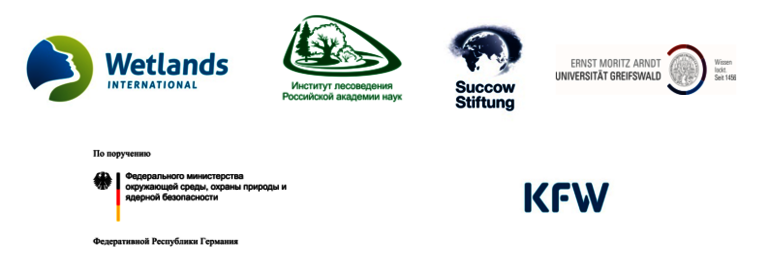Peatland Restoration in Russia
for fire prevention and climate change mitigation – phase III: Development of recommendations for inclusion data on rewetted peatlands into the national climate reporting of the Russian Federation
Attention: In response to Russia's war of aggression on Ukraine, the Succow Foundation has discontinued the project indefinitely in consultation with the donor.
More than 8% of Russia’s land area is covered by peatlands. In the past, these were drained on a large scale to gain land for agriculture, forestry, and peat extraction. Following the collapse of the Soviet Union, many of these former peatlands fell out of use. Today, many of these now fallow areas – a total of ca. 2.75 million hectares – pose a serious fire hazard. In addition, they represent a source of greenhouse gases that result from peat mineralization caused by the drainage. According to some estimates, Russia is the third largest emitter of greenhouse gases from drained peatlands in the world. In view of the devastating peatland fires of 2010, the Russian government decided to initiate the rewetting of degraded peatlands as a preventative measure, and has applied for international support for this undertaking. An agreement signed by German chancellor Angela Merkel and Russia’s president Dmitri Medvedev in July of 2011 lead the way for a joint German-Russian project that includes German investments for further development of technical expertise and Russian investments for the rewetting measures’ actual implementation.
Rewetting drained peatlands has proven to be effective in reducing greenhouse gas emissions and can help countries to achieve the national goals of the Paris Agreement, a Nationally Determined Contribution (NDC). At the same time, this increases biodiversity on these areas, prevents fires and opens up new sources of income for the population.
The aim of the project is to demonstrate the potential of peatland management to reduce greenhouse gas emissions in climate change mitigation and thus increase the resilience of landscapes to climate change as an adaptation measure. The project creates an improved legal and policy framework for these restoration measures by developing (1) a methodology for regional peatland inventories that is compatible with the UNFCCC reporting template, (2) guidelines for reporting on peatland-related mitigation measures, (3) a methodology for assessing the reduction of greenhouse gas emissions from peatland rewetting, (4) a methodology for assessing greenhouse gas emissions from peatland fires, (5) recommendations and reporting forms for including information on the reduction of greenhouse gas emissions from peatland rewetting in climate change mitigation and adaptation reporting. In addition, an integrative assessment of the changes in ecosystem services caused by the restoration of ecological peatlands is planned. The project activities include the inventory of peatland areas and their prioritization for rewetting, the rewetting of peatlands, especially in the Kaliningrad region, and a pilot of the developed methods.

Peatland Restoration in Russia
for fire prevention and climate change mitigation – phase III
Location: Russia
Duration: 07.2020 - 12.2023

Olga Denyshchyk
Expertise: Moore und Paludikultur
Tel +49 3834 83542 32
The project is financed by the German Federal Ministry for the Environment, Nature Conservation and Nuclear Safety through KfW development bank in the framework of the International Climate Initiative (ICI). It is a joint venture of Wetlands International (Netherlands), represented locally by Wetlands International Russia, the Michael Succow Foundation and the University of Greifswald (both partners in the Greifswald Mire Centre) and, last but not least, the Institute of Forestry at the Russian Academy of Sciences. It is carried out in cooperation with the Ministry of Natural Resources and Ecology of the Kaningrad Province, State budget Institution of the Kaliningrad region "Nature park "Vishtynetsky" and the Russian Ministry of Natural Resources and Environment.

